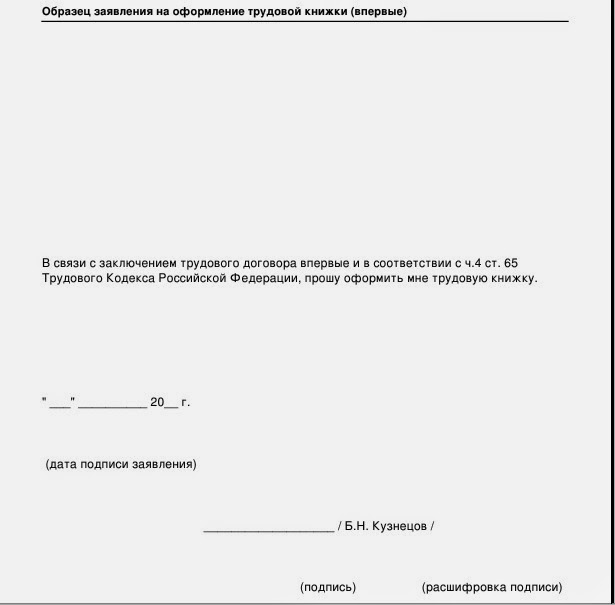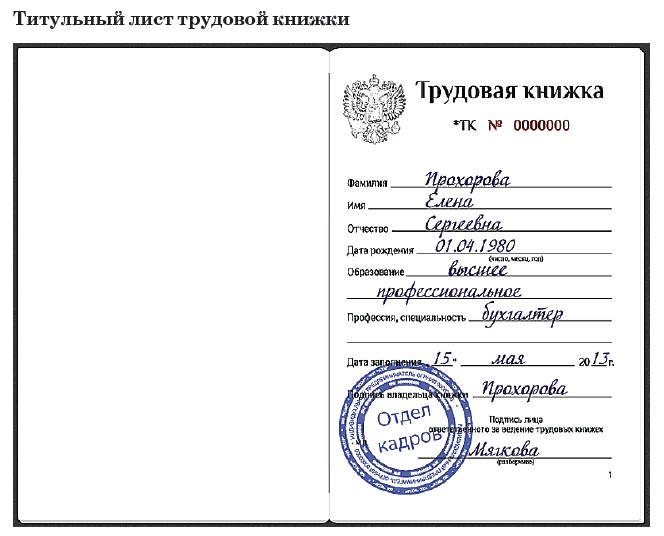First time to work... As a rule, the first job is remembered forever! All successful people Once upon a time we started our careers with that very first job, which brought certain experience, money, unusual sensations, disappointments and much more.
Unfortunately, many people do not speak very warmly about their first job, where things were, to put it mildly, not the best. in the best possible way. Be that as it may, it is in your best interests to do so as to smooth out as much as possible the unpleasant impressions from a new milestone in your life, from stress when you find yourself, even at the best, but still at work, on someone else’s territory, and in first time.
- Remember a few rules, thanks to which your very first time at work will not bring unpleasant surprises.
1. Nobody owes you anything, so you shouldn’t be offended by some employees completely or partially ignoring you at first. Everyone is preoccupied with their own personal problems, so don’t be upset if everyone doesn’t immediately run to your aid with support, work advice and encouragement. You are a stranger to the team, a foreign body that somehow miraculously found itself in their familiar environment. Treat this with understanding and prepare in advance for the fact that not everyone will be delighted with your appearance.
2. Be as open as possible.
At the same time, there must be absolute openness on your part towards. It is quite possible that someone will really want to help with something, suggest something to an inexperienced colleague on his first job. Some will be willing to help you, others will ignore you, all this is normal.
- You just shouldn’t close yourself in your shell and fence yourself off from the whole world, because in this way you can make even the most favorably disposed people towards you feel negative.
Listen to comments, advice, pay attention to criticism, quickly correcting mistakes in your work. Don’t be shy to ask something again, ask questions, communicate. Demonstrate to everyone a desire to work and a sincere interest in gaining new knowledge and experience. This line of behavior is much more advantageous compared to sitting silently like an idol at your workplace, afraid of disturbing someone again. We are by no means talking about intrusiveness, but normal involvement in the work process will bring more dividends than excessive modesty and shyness.
3. Don't be overly frank.
No matter how sweetly they smile at you, don’t forget when you find yourself at new job that some “” will run at warp speed to the authorities and colorfully express your sentiments. Don’t even think about blurting out, for example, that you don’t like your manager, one of your colleagues, or that the company is not what you previously imagined. Forget about it, otherwise you will simply be “eaten.”
Few people will tolerate criticism and disrespectful attitude from an employee who is taking the very first steps at work, in his career... For this reason, many young workers do not even manage to pass. Leave your negative impressions to yourself if you want to continue working. Be prepared in advance for the fact that some will be biased towards you, even hostile, some friendly, some neutral... Everyone has gone through this with varying degrees of success.
Your main tasks at your first job are to prove yourself as much as possible, to establish yourself with best side, get the first entry in the work book and resume, which will allow you to find something more promising in the future. It is unlikely that anyone will specifically want to harm you. More than likely, you may be the one main reason unsuccessful first experience, due to the wrong line of behavior and stupid mistakes.
- Be as friendly and open as possible, seize every opportunity to learn something new and gain valuable experience from people who have already walked a certain path and can teach you something.
It is also useful to navigate. " First time at a new job“may turn out to be a successful start to a great career, or maybe... let's not talk about the bad, just behave adequately, and let everything work out for you!
Going to work for the first time...
When one journalist asked Liz Taylor how she survived her numerous divorces, the actress replied: “The first time is the most difficult, and then it gets easier and easier.” In many job advertisements as mandatory requirement Employers indicate work experience to applicants. Accordingly, numerous graduates Russian universities Those who have not yet had time to gain this experience find themselves in a difficult situation: despite the education in their specialty, it is very difficult to get a job. They offer either unattractive positions or a tiny salary. At the same time, employers complain about the inflated ambitions of graduates and their complete lack of understanding of the realities of today's labor market.
What should graduates do in such a situation? If possible, it is better to start preparing for work as a student. How to do this? You can combine your studies with a part-time job (even if not in your specialty). In this case, you will get real work experience, you will be able to evaluate your strengths and weaknesses. If you manage to find a part-time job related to your future specialty (for example, a student at a pedagogical university can work as a nanny or lead a children’s club at an institution additional education), then getting a job after receiving your diploma will be much easier, even if you do not have a work book with a record of your position. You will psychologically feel much more comfortable and relaxed when communicating with a potential employer. If your university expects production practice, use it as a chance to learn more about future work and get useful connections. Everything you do for the first time seems difficult. Therefore, consider the issue of employment in advance. “Browse” the Internet in search of a suitable vacancy, post your resume on specialized sites. So, one of my friends, by the time she defended her diploma, posted many of her resumes on job sites. She received a degree in biophysics and knew decent English and PC. As a result, my friend was offered a position as a manager at a computer company. She did not refuse and successfully worked for two years in good location with a normal salary, after which she entered graduate school and took up science.
Be sure to go to interviews. Even if you are sure in advance that your candidacy will not suit potential employer or given workplace you are not very interested, you will learn to pass an interview easily and with a smile, you will be able to competently answer the most frequently asked questions.
If you first started looking for a job only after graduation, you will have to come to terms with the current state of affairs. Most likely, you will be offered a job that is not in your specialty or will be invited to a position that is not the one you expect. If you are determined to find a job in your specialty and are not ready to work as a secretary or sales agent, be prepared for the fact that the process of finding a suitable vacancy will be long. Typically, employers pay recent students much lower salaries than more experienced employees occupying similar positions. Employers can understand: having an employee with work experience is a guarantee of what he will do fewer errors, and he will have to explain much less than a beginner. Unfortunately, the learning process in our universities is still far from real life: students diligently study theory, but in most cases practice is rather poor, so a university graduate is not yet a specialist, but only a person who has the opportunity to become one (of course, there are exceptions to this rule). Therefore, do not demand too much at once. Even having a diploma with honors does not guarantee a good job. Increase your professional level: study specialized literature, go to trainings, communicate with experienced colleagues. Your efforts will not be in vain. Gradually, you will turn into that experienced specialist who is literally hunted by employers. Of course, the process will take more than one year, but without difficulty, as they say...
If you're applying for a job for the first time, think about what you want from it. Which of your wishes are mandatory, and which, in principle, can be changed. Are you ready to work in your specialty, but for 200 dollars, or as a secretary, but for 400? Do you want to get a job so that you can work in this organization for another 20 years, or are you ready to gain experience and move to another place? Of course, graduates should not look for a job “for life.” You don’t yet have a sufficient understanding of your own capabilities and their true price, so if you are offered a workplace that is not ideal, but acceptable for you, accept it, then you can always change it. For a young specialist, changing jobs is a normal occurrence, and with proper preparation it is painless.
Develop additional skills that are not required for a specialist in your profile, but useful for work. First of all, this is ownership. foreign language(if it is taught at an insufficient level at a university, teach it in courses or independently), knowledge of various computer programs(working with texts, graphics, accounting, warehouse accounting) - they can also be mastered independently or in courses. Don't be afraid of unexpected combinations. It is quite possible that a translator with knowledge of the basics of computer design will the most valuable specialist in a design bureau or company engaged in the creation of Internet resources.
Alas, today no one can guarantee young people without experience employment in their specialty and on decent conditions. Of course, this also depends on the specific specialty. Currently, there is an increased demand in the labor market for technical professions. It is easier for a programmer or production engineer to get a job than for a philologist or economist. But such a situation stimulates the development of such qualities as determination, the ability to make one’s way and build one’s own life, to seek non-standard solutions. Therefore, when you understand that you should not wait for manna from heaven and that a diploma from even the most prestigious university in itself does not provide work and income, and what matters to the employer is not only the “credentials” of education, but along with it practical skills, a chance to get a job will show up for work. But this job probably won't be your dream come true.
A graduate should definitely pay attention to his personal qualities. If to study at a university it is enough to attend lectures and prepare for exams, and all that threatens in case of a mistake is a bad grade, then at work you are responsible for your actions, your mistakes will cause losses to the employer and will affect your career. Therefore, increase your level of personal responsibility and do not leave gaps in knowledge. The attitude towards work according to the student principle “I passed with a C, and thank God” does not contribute to a successful search for a decent job. Do everything 100%. You have the most valuable resource: optimism and youthful energy. Make an effort in the right direction - you will have every chance of successfully building a career or creating your own business. By the way, the current multimillionaire, the creator of Microsoft, Bill Gates, at one time did not even finish his studies at the university: he became interested in computers and creating software. So initiative and self-confidence are useful tools to achieve business success. Approach your job search not from the position of “poor, unhappy me, no one is hiring, what should I do?”, but with the question “how can I realize myself most fully?”, show patience and willingness to go towards the goal step by step - and you will inevitably succeed.
If you lack self-confidence, consult with good psychologist, attend confidence training. No one needs your problems, no one will solve them for you. Good or bad, this is the truth of today's life. Therefore, create your own personality, create a workplace for yourself!
The “conveyor” operating principle is slowly becoming a thing of the past; your knowledge, your experience plus your unique personality are what are worth the most. The era of creative solutions in business is coming. If you can generate practical and at the same time creative solutions, then you will not need to look for a job, the job will look for you. There are many employees and good specialists still not enough. Become one of them and enjoy interesting work and a decent salary!
To view comments, please enable JavaScript (Active scripting).
I'm going to apply for a job for the first time soon, it's very scary. What you need to know for everything to go well. When is it issued? employment contract? after probationary period or on the first day? what do you need to know about salary?
Hello! First of all, I would like to wish you good luck! Don't be afraid of anything) As far as I know, an employment contract must be drawn up on the first working day. Although, it all depends on the company. In some companies, an employment contract is concluded only after a probationary period. Regarding the salary: I would advise you to find out whether the salary is provided, when the salary is paid and how exactly. I also highly recommend that you make a list of questions that you will ask the employer. Good luck in your career!
Prepare for this day. Prepare all the documents that are necessary. The employment contract is drawn up immediately, on the first day. It specifies the period of the probationary period, as well as by how much the salary will be reduced for the period of the probationary period. Don't be afraid of anything. Just calmly clarify everything with the specialist who will draw up the documents for you.
Buy a book of the Labor Code of the Russian Federation and read it periodically if you are so concerned about labor issues. I wish you successful employment!
When applying for a job, an employment contract is first drawn up in two copies between the employer and the employee, which specifies the amount wages, working hours, probationary period, rights and obligations of the employee and the employer, etc., consent to the processing of personal data is drawn up, then the employer writes an order to hire the employee, everything is signed on both sides, the employee is accepted and goes to the workplace with on the day specified in the contract and order.
There is a lot on the Internet useful tips during employment. Don't be lazy, read it.
Here it is important to know everything about the company where you want to work.
Appearance is quite important.
Correct speech.
A resume is a must, no matter how small, but every person has strengths.
An employment contract in a normal company is usually signed within a week of your employment. Well, just so as not to make unnecessary movements if something goes wrong in the first days.
Don't be late, this is not acceptable for beginners.
You can find out about your approximate salary on the Internet and under no circumstances agree to a small salary.
The probationary period is from 1 to 3 months; during this period, they usually set a slightly lower salary, but not by much.
In general, don’t be afraid, there will be many more interviews in life. Think of it as dating. You ask questions to you too. Only the employer, as a rule, has a trained eye and can determine from the first moment whether you will work for them or not.
Just be confident in yourself!! Good luck!!! And a good boss to you)
Be more confident. Do not hesitate to ask about working conditions, about the responsibilities that you will have to perform, but first ask about the responsibilities so that you do not get the impression that you are only interested in money)))). The employer will also ask about your abilities, plans for the future, he also plans his work and evaluates his prospects for the future. This is a market and you negotiate and always on paper, the 2nd copy of the employment contract signed by the manager and you must be in your hands, you can also ask for a copy of the order
The employment contract is signed immediately, it specifies the duration of the probationary period, usually three months. Regarding salary, ask how it is calculated in the company: are there additional payments, what do they depend on (for example, the implementation of some plans), what deductions are there, deductions and for what. You must clearly understand how the monthly salary is calculated.
Hello!
I have a little employment experience behind me, so I can tell you my experience. An interview is inevitable; the director/manager will first talk to you to understand what kind of character you are, ask about your education, what you previously worked for, and why this particular vacancy. There may be questions from outsiders, but this is for the sake of completeness. There is no need to be secretive; speak directly and clearly. It happens that the director asks only one question - tell us about yourself. Here it is worth starting with your education, where you studied and for whom, you have no previous work experience and you can add that you are easy to train. There is no need to praise yourself and belittle yourself either.
Then, if you have satisfied the authorities, they will give you a contract. They may also give you a form to fill out. Read all papers carefully! And then sign. If you don’t understand something, ask again.
Find out about your salary right away so there are no surprises. But it also happens that it differs in the first 3 months, that is, during the probationary period. I didn't have that.
Good luck!
An employment contract is drawn up almost immediately as soon as the employer decides to hire you. The salary will most likely be announced to you, for example, during an interview. It is worth reading the Labor Code to have an idea about the stage of the device. Sometimes an employer may offer training or internship, for example, if the previous employee is still working his last two weeks.
The employment contract is drawn up on the first day of your work, in two copies. One will be given to you after it is signed and stamped by the Head of the HR Department. Also, on the first working day you are fully registered for work, that is, you are added to the staff. Since you don’t have a work record, it will be created in the personnel department. To apply for a job you need: passport (copy), personal identification number, pension certificate, education diploma. Even if you are on a probationary period, you must still be hired according to the rules, that is, placed on staff. If, after the expiration of the probationary period, you decide not to work here, you must notify the employer three days in advance. Also, if you are not suitable for this job, you will also be notified three days in advance. And one more thing about wages: the contract generally stipulates only the salary. In addition to this, there are also bonuses and allowances. So you need to find out what you will receive. So ask: what will my salary consist of? The contract also specifies the days when it is paid. For example, on the 5th and 25th.
You see a question that one of the site users asked the Universe, and the answers to it.
The answers are either people very similar to you, or your complete opposites.
Our project was conceived as a way of psychological development and growth, where you can ask advice from “similar” people and learn from “very different” people what you don’t yet know or haven’t tried.
Do you want to ask the Universe about something important to you?
Work book – official document, which consolidates all information about the work activity of a particular employee.
It is not at all surprising that such an important document as a work book is kept by the employer - it is there that it will be safe and sound all the time the employee works in the organization labor activity. What to do if there is no work book? How to apply? And where do they get it?
Dear readers! Our articles talk about typical ways to resolve legal issues, but each case is unique.
If you want to know how to solve exactly your problem - contact the online consultant form on the right! It's fast and free!
 Work can begin at any age and a work book can be obtained quite early. But many inexperienced workers, employers and personnel department employees do not have the slightest idea how to fill out a work book when it is issued for the first time.
Work can begin at any age and a work book can be obtained quite early. But many inexperienced workers, employers and personnel department employees do not have the slightest idea how to fill out a work book when it is issued for the first time.
Lack of experience and a certain uncertainty contributes to the fact that when filling out a work book, people make many mistakes, which is why they have to clear up the dirt in the work book or, simply, get rid of it.
In this article we will teach you contribute correctly all records in the labor record of a newly hired employee for a labor function in the organization, especially if this is his first work experience. We will also tell you about all kinds of nuances in filling out, conveniently arranging the information you are interested in point by point.
Enjoy your reading and remember that any entry made by your hand in the work book leads to the onset of certain consequences, but which ones: favorable or not - you must decide for yourself.
At what age can you start?
As we know, in our country the age of absolute majority begins with eighteen years old. Of course, today many employees of the government apparatus are trying to reduce this figure to twenty-one years, but the civil code of our country spells out the figure at eighteen years.
 Also minor child there is always an opportunity to undergo the procedure emancipation.
Also minor child there is always an opportunity to undergo the procedure emancipation.
To do this you need to get a job employment contract or engage in business activities.
Parents or the guardianship and trusteeship authority must submit a petition for emancipation of the minor in court, and the court, based on the results of consideration of the documents presented, must decide whether to reject this petition or not.
Thus, if a child has undergone the emancipation procedure, then he will be able to work officially under an employment contract from the age of sixteen.
This means that a work book can be opened in his name. from this age. Of course, such cases are a very small percentage in Russia, but still, they happen and happen everywhere, which is why they also need to be taken seriously.
How and where can I do it (get it)?
If you went to get a job for the first time you don't have to worry about where to get it work book if it didn't work. You can independently use several ways to obtain a job, which are provided by the state and other regulatory legal acts. We will look at each of them in more detail in the following paragraphs.
Purchase
 The work book can be buy it yourself. As a rule, samples of work books established by law are sold in bookstores. You purchase this document yourself and submit it to the employer yourself.
The work book can be buy it yourself. As a rule, samples of work books established by law are sold in bookstores. You purchase this document yourself and submit it to the employer yourself.
This is where your actions end and the employer begins to filling out important document. But according to the law, the burden of purchasing a work book is not yours. Who should provide you with it and how? labor document we will tell you in the next paragraph.
Who should buy?
You must purchase a work book the organization itself or individual entrepreneur(employer). As a rule, organizations have a power of attorney under which they purchase labor documents in several copies and issue labor documents to newly arrived employees.
Thus, the employer cannot oblige you to buy a work permit - this is your purely personal desire. But the employer can deduct the cost of the book from your earnings.
How is the cost of the work book deducted from the salary?
 Wages citizen is a monthly incentive for work. Unfortunately, many citizens are not notified by their employer that the costs of purchasing (paying for) a work book can be deducted from this amount.
Wages citizen is a monthly incentive for work. Unfortunately, many citizens are not notified by their employer that the costs of purchasing (paying for) a work book can be deducted from this amount.
According to Labor Code-This should only be done with the consent of the employee. Of course, the money withheld on the purchase is not commensurate with the amount of wages, but still, it is better to know where the money you honestly earned goes to.
Order on charging a fee for a work book
If an employer notifies an employee that he is going to collect labor costs from his salary, this does not mean that he is doing everything according to the law.
Unfortunately, not all employers know that such an action as collecting money for a work book must be confirmed by an order with the appropriate number and date.
The order must be provided to the employee for review and only after that the funds can be written off in favor of the employer.
By whom is it carried out?
The order is issued by general rule the employer or his deputy. HR department employees also have the authority to issue orders.
Only these people have the right to put a seal on the order and declare it a valid local regulatory act for the organization.
Where is it issued?
 The work book can be issued to you for the very first time in the human resources department of the organization. Unfortunately, very often employees do not know this and fill out the newly purchased work report themselves.
The work book can be issued to you for the very first time in the human resources department of the organization. Unfortunately, very often employees do not know this and fill out the newly purchased work report themselves.
This should not be done under any circumstances, so immediately contact either your employer or a HR employee for the correct registration.
How long does it take for an employer to keep a work record book?
The employer must open a work book for the newly hired employee within a week after both parties have signed the employment contract. The work book is provided to the employee to check the entered data, as well as to sign his name.
After this, the book remains in the custody of the employer or an employee of the HR department until the employee completes his work at the place of work.
What documents are needed to obtain?
In order to obtain a work book for the first time, you need to enter into an employment contract with the organization. You must also provide your passport and make photocopies of it.
Do not forget that upon the fact of your employment, an appropriate type of order must be issued. Only the presence of all of the above documents at once gives the right to the HR department employee (employer) to open a work book for the employee.
Application for establishment
 Many people believe that in order for an employee to be issued a work book for the first time, that is, to be brought into an organization, he needs to fill out an application. But this is far from true.
Many people believe that in order for an employee to be issued a work book for the first time, that is, to be brought into an organization, he needs to fill out an application. But this is far from true.
In fact, it is not necessary to draw up an application, but if the organization’s charter provides for this requirement as a mandatory requirement, you will have to comply with this circumstance.
Sample application for the issuance (registration) of a work book form when hired for the first time. 
Filling
Filling out a work book for the first time is a very important and sensitive process; all the rules must be followed. Try to treat it as carefully as possible, because there is a high probability that you will not be able to write the entry correctly the first time.
How to issue a work book for an employee for the first time? This article is intended only for people who draw up a work book when applying for a job for the first time)
When hiring an employee for the first time, pay attention to main turn of the labor. It contains information about the employee. It must be filled out based on your passport data, as well as the provided diploma of completion of a higher educational institution or secondary or secondary vocational education.
We write the employee's last name, first name and patronymic correctly.
Sample of filling out a work book for the first time (title page) 
 The next point, based on the passport, indicate the year of his birth. Next, you need to provide information about your education and specialty. After this, the employee must sign the document.
The next point, based on the passport, indicate the year of his birth. Next, you need to provide information about your education and specialty. After this, the employee must sign the document.
Only after this do you turn over the labor page and find yourself on a double page where you need to leave information about the employee’s position.
Here you put the first serial number, the date of completion and indicate the name of the organization, as well as the position for which the employee was officially hired. Do not forget to indicate the number and date of the order, which indicates the employee’s acceptance for the position.
Don’t forget to put the employer’s stamp and signature on the first entry made.
To check, let the employee review the records. Perhaps, with fresh eyes, he will find errors that can be eliminated without changing the work book.
Work book for a minor
If a citizen has undergone the emancipation procedure, but is still a minor, then the work book for him is also is being drawn up, however, small nuances appear in this design.
 You also fill out information about the employee’s first, last and patronymic names on the main page, and enter his date of birth. But under no circumstances fill out the lines about education and specialty.
You also fill out information about the employee’s first, last and patronymic names on the main page, and enter his date of birth. But under no circumstances fill out the lines about education and specialty.
It is quite possible that after some time the emancipated minor will decide to change his field of activity or even graduate from several higher education degrees at once. educational institutions, and in the labor report, in the line about education, there will be a record of secondary education.
Conclusion
Filling out a work book when applying for a job for the first time should be the most neat. After all, this document begins the employee’s career, which will probably not be smooth, but you should make a good start with your competent and qualified entry.
Be careful and legally savvy, and then from the very first time the document you fill out will be considered exemplary.
There can be two scenarios for getting your first job: a very successful one, but unlikely, or an ordinary one, that is, associated with all the difficulties and obstacles - with resumes being sent to many addresses with a small number of responses, interviews that are not at all passable, as it would seem, and waiting response with an offer that may not come at all.
Many graduates feel as if getting a job is a matter of choosing between life and death. Although any job will have an impact on their career, they should remember that the first job is a launching pad. The chances are that this will be far from an ideal place and, moreover, not at all what the applicant dreamed of. However, it can provide the foundation for a satisfying career.
To avoid making the wrong move and ending up in the wrong place, here are 12 job search tips you might want to consider before you accept your first job.
1. Weigh your starting salary options. Choose an area where you would like to work and study the job market in that sector. To do this, use the appropriate Internet sites where you can find information on average wages. Then figure out whether the proposed income will be enough to pay the incoming bills.
2. Familiarize yourself with the entire payment package offered. Salary is only part of the entire compensation package. So it's best to evaluate the entire package: Does the company offer insurance? How long do employees have holidays, etc.?
3. Think about the quality of the company. The content of the work and the quality of the organization should be of paramount importance. At the end of the day, what we're talking about is that you're looking for a job that will give you larger number options for promotion and choosing the next step. So before you say yes, compare the work environment and culture of the organization, opportunities for advancement and compensation levels.
4. Job satisfaction is more important than salary. Take a closer look at the issue of job satisfaction. To do this, you need to weigh your abilities and the pleasure you get from using them with the qualities you would like to acquire and the rewards that matter to you.
5. Evaluate the employer's brand name. Does the company care about capable employees? Does the company engage in workforce development? What incentive systems are in place? Are workers encouraged to participate in decision making? All of these questions are key indicators of employer brand and whether the company is investing in capital like people.
6. Avoid prompts. Don't listen to others who tell you what you should want. Before you accept a job, make sure it's what you want and not what your parents, friends, or college mentor would have wanted.
7. Make decisions based on real life conditions, rather than guessing “what if?” What you create for yourself today will not suit you in 20 years when you start a family and have to pay off mortgages for real estate. Always be realistic and remember that the way you manage your employment and life will change many times over the course of your life.
8. If possible, find out where your predecessors are now whose place you took. Training and development are fundamental elements in the first job, as they give impetus to the entire career. How your boss promotes his employees inside and outside the company is a major indicator of how good he is at training people.
9. Location of work. What is more important to you: to have good job in a great location, or a great job in a place that doesn't look so tempting? If location, work culture and lifestyle are important to you, then look at another job option if the location means more to you.
10. Be aware of what you are actually looking for. Despite spending a lot of time and effort, not to mention money, to earn a degree or title, too many of us still don't know what to do after graduation, hoping to figure it out along the way. You don't have to try to plan your entire life ahead, but you should at least have an idea of what you want to do so you don't waste time and energy trying to get a job you don't want.
11. Correctly assess the meaning of connections. If the slogan is important for the real estate industry - location, location, location, then for career growth The concept of connections is important. Most jobs are filled through word of mouth and cross-referencing, so maintain useful contacts.
12. Finding a job is a job in itself. It sometimes takes months to find a job.
In most cases, students think that by declaring their readiness to accept any job in any company, their chances increase. In reality, this hurts them as employers tend to hire people who know what they want, understand how they contribute, and who have an interest in both the role and the organization as a whole.




